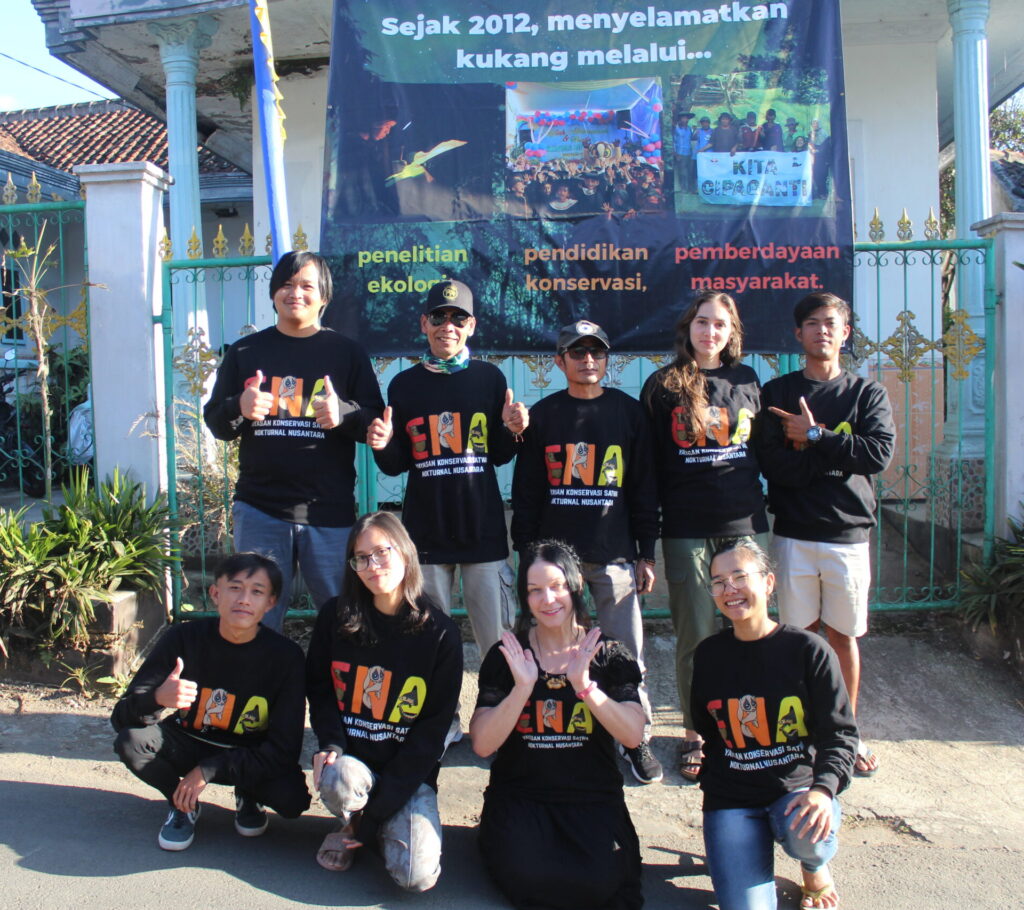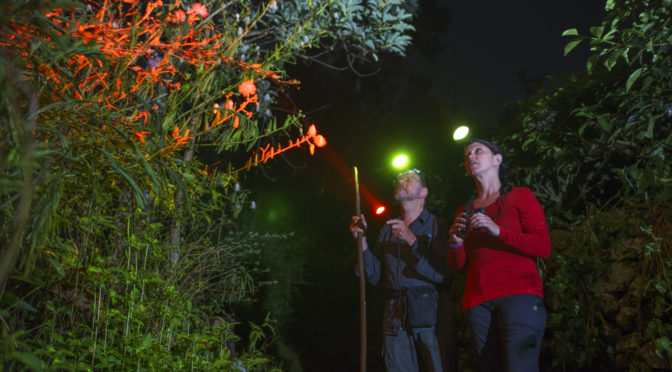The Little Fireface Project (LFP) team, headed by Professor Anna Nekaris OBE, studies the ecology of slow, slender and pygmy lorises, and contributes to the conservation and ecology of lorisiform species across their range. Our scope of research encompasses behavioural ecology, museum studies, genetics, acoustics, taxonomy, conservation education and chemical ecology.
1994
Beginnings of Loris Research
Prof Anna’s research on lorises began under the remit of the Nocturnal Primate Research Group at Oxford Brookes University, UK.
1995 – 2006
Long-Term Field Studies
Prof Anna launched a long-term study of grey slender lorises in India and conducted island-wide surveys of Sri Lankan slender lorises. Her research re-elevated the red slender loris to species status, and she led the first radio-tracking study of the species in Sri Lanka.
2006
Conservation Work in Indonesia
Prof Anna first visited Indonesia to assist NGO Pro Animalia in establishing the country’s first slow loris rescue centre, now the International Animal Rescue (YIARI) slow loris rehabilitation centre in Bogor. She was later invited to re-Red List all Asian loris species, shaping their conservation status.
2007
Scientific Discovery and Policy Change
Prof Anna co-authored a paper naming a new slow loris species, Nycticebus hilleri, and confirming N. javanicus as a distinct species. LFP also led law enforcement training across Southeast Asia and Japan, resulting in arrests of tourist photo touts and slow loris confiscations. That same year, COP14 in The Hague approved the transfer of slow lorises to CITES Appendix I, granting them the highest level of protection.
2007 – 2010
Pioneering Field Studies on Wild Slow Lorises
Prof Anna advised and participated in the first study of wild Bengal slow lorises in Thailand with Manoon Pliosungnoen and in Northeast India with Dr Nabajit Das. She also collaborated with Dr Carly Starr on the first radio-tracking study of wild Southern pygmy lorises in Cambodia. Additionally, NPRG PhD student Richard Moore conducted the first study on Javan slow loris translocations in partnership with International Animal Rescue.
2011

Little Fireface Project is born
The Slow Loris Fund charitable fund was established under Oxford Brookes Development Office, with Little Fireface Project as it’s main research project.
2012
Long-Term Research in Java
Prof Anna establishes our long term research study on the Javan slow loris based in Cipaganti, West Java, Indonesia, and the first wild individual Ena was collared with a VHF radio collar.
2013
Community Engagement and Rescue Initiatives
The Little Fireface Project (LFP) launched the Nature Club (Klub Alam) and Slow Loris Forest Protector programme to engage local communities in conservation. LFP also collaborated with Love Wildlife in Thailand to establish a rescue centre for slow lorises from the photo prop trade. In Indonesia, a partnership with Cikananga Wildlife Rescue Centre began, marked by a Slow Loris Action Plan workshop to enhance conservation efforts.
2014
Education for Conservation
Construction begins for Mi Al-Hidayah, a village school for national curriculum and nature teaching.
2016
Advocacy and Conservation Innovations
Following LFP’s campaigns and petitions, Facebook introduced an ‘animal cruelty’ report option to tackle wildlife exploitation online. At LFP Java’s research site, the first wildlife canopy bridges were installed to reduce habitat fragmentation. LFP also contributed to the Slow Loris Action Plan for Vietnam in partnership with the Endangered Asian Primates Trust.
2017
Research and Policy Developments
LFP PhD student, now Dr Stephanie Poindexter, conducted a study on translocated lorises in Cuc Phuong National Park, Vietnam.
Building on 2007 efforts, Japan considered a motion to amend CITES Appendix I permit laws to prevent slow loris falsification.
2018
Re-Red Listing and Expanding Research
Prof Anna and LFP members re-Red Listed all loris species, updating their conservation status. The team also conducted research at the Bang Phra Waterbird Sanctuary in Thailand and carried out the first nocturnal primate survey in the Central African Republic, focusing on angwantibos.
2019
Advancing Conservation and Sustainable Practices
LFP advised the Bengal Slow Loris Project, supporting conservation initiatives for the species. A formal hunting and littering ban was announced in Cipaganti, strengthening local wildlife protection. The Wildlife-Friendly Coffee Program was officially launched to promote sustainable farming practices. LFP members also took part in the Slow Loris Action Plan with Love Wildlife in Thailand, contributing to regional conservation efforts.
2020

Wildlife Friendly Coffee Program
The LFP Wildlife-Friendly Coffee Program received official Wildlife Friendly certification, recognising its commitment to sustainable farming. Additionally, the first book on the evolution, ecology, and conservation of lorises and pottos was published, providing a comprehensive resource on these primates.
2022
Taxonomic Advances
LFP scientists named a new genus for pygmy lorises, Xanthonycticebus gen., marking a significant taxonomic advancement. Collaboration began between LFP and Plumploris e.V., strengthening conservation efforts. The LFP team also conducted research on Bengal slow lorises in Khao Lak, Thailand, in partnership with the Love Wildlife Foundation.
2023

Strengthening Institutional and Educational Impact
LFP gained legal status as a charitable foundation in Indonesia under the name Yayasan ENA (Endangered Nocturnal Animal Foundation), complementing its UK charitable status. Prof Anna was appointed Vice-Chair of the IUCN Primate Specialist Group subsection for African and Asian Nocturnal Prosimians. Additionally, LFP’s education curriculum was officially incorporated into Indonesia’s national curriculum, expanding its impact on conservation education.
2024
Honouring Conservation Leadership
Professor Anna Nekaris is awarded an OBE for her work in slow loris conservation.

